| |
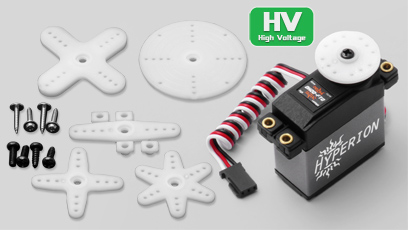 Hyperion
ATLAS Digital Servos Hyperion
ATLAS Digital Servos
ATLAS Digital High-Voltage DH Servos run on 6.0V~7.4V input, and are ideal
for direct input via LiFePO4 or Lipo 2S receiver packs.
Models which use 2S main packs of between 6.6 and 8.4V - such as many gliders and RC cars - can power the
DH servos from the main power pack, saving the weight and hassle
of Rx batteries or BEC units. Standard Voltage "DS" Series ATLAS Servos run on 4.8 to 6.0V nominal input.
Top competition glider makers are the
harshest servo critics in the world, and the very best are
insisting on Hyperion DS09 servos for their
models. AVIONIK took the top spots in recent Japan Open
F5B competition using Hyperion ATLAS servos, for just one
example...
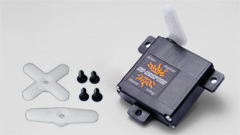 Hyperion ATLAS
Digital, Programmable Servos are among the finest servos in the
world. They are made strictly to Hyperion specifications at
one of the foremost electronics companies in South Korea, from
components made only in Japan and South Korea. The gears - a
key element in any quality servo - are made to exceedingly fine
specifications. The CarbonPoly type, using a mix of
long-polymer plastics and carbon fiber, more than double the sheer strength
and wear compared to normal plastic gears. The metal gears used in
ATLAS servos are extremely tough and - because they are produced with very
tight specifications - are also quiet, smooth, low-lash, and long-wearing. Hyperion ATLAS
Digital, Programmable Servos are among the finest servos in the
world. They are made strictly to Hyperion specifications at
one of the foremost electronics companies in South Korea, from
components made only in Japan and South Korea. The gears - a
key element in any quality servo - are made to exceedingly fine
specifications. The CarbonPoly type, using a mix of
long-polymer plastics and carbon fiber, more than double the sheer strength
and wear compared to normal plastic gears. The metal gears used in
ATLAS servos are extremely tough and - because they are produced with very
tight specifications - are also quiet, smooth, low-lash, and long-wearing.
In terms of centering accuracy, consistency, and ability to
deliver rated torque regardless of temperatures encountered, ATLAS servo
testers worldwide have favorably compared the ATLAS to the finest offerings
from top Japanese servo producers.
Of course, the Hyperion ATLAS have some rather large
advantages compared to other Digital Servos on the market. They are
fully programmable for a wide variety of settings, using an inexpensive USB
adapter cable. And - considering the huge investment in precision molds and
highest quality components Hyperion has made - they are very attractively
priced. You may find cheaper Digital Servos, but you won't find a
higher value...
A note on specifications: R/C modelers often consider torque to be the
single most important specification when buying a servo. As a result,
the general trend has been for manufacturers to advertise very high torque
figures for their servos. In many cases, manufacturers simply pluck
these figures "from the air", rather than base the figures on test results.
In other cases, the servo may perform as advertised - at least while cold -
but draw very high current while operating. Such high currents can
cause models to crash when BEC circuits are overloaded, or receiver packs
depleted - and servo life will always be shortened.
DH-20-FTD HV Servo with Titanium gears and heat sink
pictured below
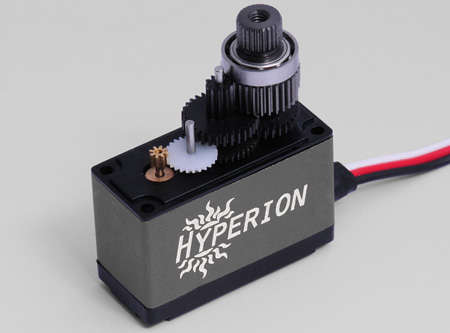 Hyperion has a different philosophy. We have designed servos that draw
lower-than-average currents; increasing safety, consistency of performance,
and reliability/longevity as motors are never overstressed. By using
quality motors and digital technology, we are able to obtain dynamic torque
figures which are always much more than adequate for each model application.
And due to the digital controller, "holding" torque figures are typically
DOUBLE the dynamic torque figure. In short, our servos have all the torque
you will ever need, combined with speed and reliability over a wide voltage
range... Hyperion has a different philosophy. We have designed servos that draw
lower-than-average currents; increasing safety, consistency of performance,
and reliability/longevity as motors are never overstressed. By using
quality motors and digital technology, we are able to obtain dynamic torque
figures which are always much more than adequate for each model application.
And due to the digital controller, "holding" torque figures are typically
DOUBLE the dynamic torque figure. In short, our servos have all the torque
you will ever need, combined with speed and reliability over a wide voltage
range...
Atlas
Digital Servos are programmable for a wide variety of settings, via either a
USB Adapter
or by Emeter II.
Atlas Servo Performance
Specifications
Atlas Servo Dimensions Chart
Atlas Servo Accessory & Parts
Guide
(see also GP4 gear
datasheet)
Atlas Servo Setup Guide
Atlas Servo Programming User
Guide
All Manuals above are in Adobe Acrobat format.
Download the free Acrobat Reader
HERE.
Here are some of the accessory horns available for 12~20 series servos,
pictured below. We expect to also have single-arm CNC Aluminum horns - as
well as RDS Adapters - for DS09/DS11 and DS095 Wing servos for release in
AUG/SEPT 2010.
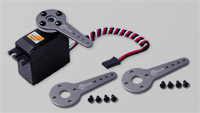 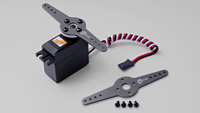
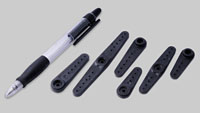
|


 Hyperion
ATLAS Digital Servos
Hyperion
ATLAS Digital Servos